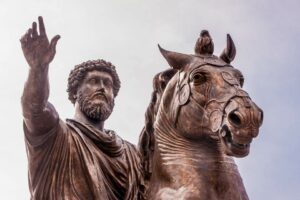Michel de Montaigne was a 16th-century French philosopher, writer, and essayist. He is known for popularising the essay as a literary form and his influential work "Essais" (Essays). Montaigne explored a wide range of topics in his essays, including human nature, ethics, education, and the complexities of the self. He advocated for self-reflexion, scepticism, and embracing the uncertainties of life. Montaigne's writing style was personal and introspective, paving the way for modern subjective and reflective writing. His works continue to be celebrated for their philosophical insights and exploration of the human condition.
Michel de Montaigne
Michel de Montaigne was born in 1533 in France. He served as a magistrate and later retired to his family estate to focus on writing. Montaigne is best known for his collection of essays titled "Essais," which he started writing in the late 16th century. The essays cover a wide range of topics, offering personal reflections, philosophical insights, and observations on human nature. Montaigne's approach to writing was unique for his time, as he wrote in a subjective, conversational style that explored his own thoughts and experiences.
Montaigne's writings revolved around the exploration of the self and the complexities of human nature. Some key ideas and contributions include:
Scepticism: Montaigne questioned commonly held beliefs, emphasising the importance of doubt and critical thinking. He advocated for a sceptical approach that challenged dogmas and encouraged personal examination of ideas.
Human nature and moral philosophy: Montaigne delved into the complexities of human nature, exploring the contradictions, passions, and flaws of individuals. He reflected on ethical questions and the pursuit of virtuous living, often examining his own actions and motivations.
Education and self-improvement: Montaigne believed in the power of education and self-reflexion for personal growth and moral development. He advocated for a holistic education that cultivates both intellectual and moral virtues.
Subjective writing style: Montaigne pioneered the personal essay as a literary form, using his own experiences, observations, and introspection as the basis for his writing. His essays were characterised by their conversational tone, digressions, and exploration of the author's own thoughts and emotions.
Scepticism: Montaigne questioned commonly held beliefs, emphasising the importance of doubt and critical thinking. He advocated for a sceptical approach that challenged dogmas and encouraged personal examination of ideas.
Human nature and moral philosophy: Montaigne delved into the complexities of human nature, exploring the contradictions, passions, and flaws of individuals. He reflected on ethical questions and the pursuit of virtuous living, often examining his own actions and motivations.
Education and self-improvement: Montaigne believed in the power of education and self-reflexion for personal growth and moral development. He advocated for a holistic education that cultivates both intellectual and moral virtues.
Subjective writing style: Montaigne pioneered the personal essay as a literary form, using his own experiences, observations, and introspection as the basis for his writing. His essays were characterised by their conversational tone, digressions, and exploration of the author's own thoughts and emotions.
Montaigne's work remains relevant due to its exploration of timeless themes and the human condition. His emphasis on self-reflexion, scepticism, and the complexities of human nature resonates with contemporary readers. Montaigne's essays provide insights into the subjective experience, encourage critical thinking, and prompt readers to question assumptions and societal norms. His approach to writing has influenced the development of the personal essay genre, shaping modern literature and fostering a greater appreciation for introspection and subjective storytelling.
Montaigne's legacy as a philosopher and essayist lies in his profound exploration of human nature, his celebration of individuality, and his contribution to the development of personal, reflective writing. His essays continue to inspire readers to contemplate life's big questions, embrace uncertainty, and engage in thoughtful self-examination.
Montaigne's legacy as a philosopher and essayist lies in his profound exploration of human nature, his celebration of individuality, and his contribution to the development of personal, reflective writing. His essays continue to inspire readers to contemplate life's big questions, embrace uncertainty, and engage in thoughtful self-examination.
Related Semantic Entities for Michel de Montaigne
